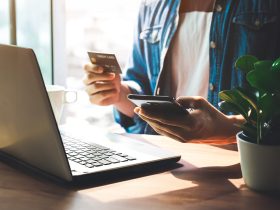Cryptocurrencies – as these new virtual online currencies are known – have no transaction fees, no bank fees, no government regulations, and no telltale ways to track them. They are real currency, but stored as encrypted digital keys instead of paper in your wallet.
Unfortunately, the very same characteristics that make cryptocurrencies attractive make them very easy to steal, unless you take extra steps to secure your computers and Internet connections. In this post, we’ll show you how.
Once you have obtained your Bitcoins or other cryptocurrency, there are essentially three ways to store them: 1) in an online wallet; 2) in a software wallet on your PC or mobile device; 3) in a paper wallet that (ironically) you print out. There are a few hardware-based wallets being developed – similar to the tokens you might use to secure PayPal and banking transactions – but they are still new.
Like anything else digital, all of these storage methods can be vulnerable to hackers and malware such as keyloggers. Before cryptocurrencies were invented, only large companies and banks had to worry about sophisticated and targeted attacks on their computer systems – and there have been at least a dozen major hacks on Bitcoin exchanges, results in tens of millions in losses. Now that you can store real money directly on your computer, the Bad Guys have motivation to attack your computer, too.
And because cryptocurrency is not governed by any sort of central bank, a hacked PC, a stolen laptop, or even a hard-drive crash could mean that your digital money is gone. Forever.
So take these minimum precautions to protect yourself:
- Secure your PC and mobile devices – To prevent keyloggers, spyware, backdoors and other vulnerabilities that allow hackers in, be sure to install antivirus on every computer and mobile phone that connects to the Internet. Consider also using safe-search and a browser extension, to avoid stumbling onto dodgy websites.
- Secure your Internet connection – Make sure the firewall on your network router is active, or activate the VPN (Virtual Private Network) feature in Avira’s security software. And don’t trade cryptocurrencies on a public Wi-Fi hotspot! Or if you use an iPhone, consider using a personal VPN app like Private WiFi.
- Back-up your (encrypted) data – Be sure to use a backup service that encrypts your data in-transit as well as at rest. Services such as DropBox can be secured with two-factor authentication.
- Protect your passwords (and paper wallets) – Use common sense and don’t let others see your passwords. Paper wallets for cryptocurrencies contain your private key (usually in the form of a QR code that any reader can decode), and if stolen will let the thief use your digital currency just like cash.
Even if you don’t plan to use Bitcoin for your next purchase, you probably have a lot of sensitive information on your computer or smartphone that is worth securing just as if it were cash. So take a few minutes to review your security. You’ll be glad you did.
This post is also available in: German














